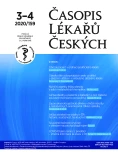Role of dietitian in obese patients’ care
Authors:
Aneta Sadílková; Kristýna Čmerdová; Aneta Hásková
Authors‘ workplace:
Obezitologické centrum, 3. interní klinika – klinika endokrinologie a metabolismus 1. LF UK a VFN v Praze
Published in:
Čas. Lék. čes. 2020; 159: 131-135
Category:
Review Article
Overview
Setting the right eating habits is one of the basic pillars of non-pharmacological treatment of obese patient. Nutritional interventions led by dietitians are a key part of obesity management. The principle of modern nutritional therapy is not the transmission of general information about nutrition, but individualized recommendations. The task of a dietitian is to provide information that is specific, requested, at the right time and in the right form, information that is understandable to the patient and can be included in his/her life.
Dietitian creates a therapeutic relationship with the patient based on trust and accompanies them on his path to mastering the principle of a diet for weight loss. There is thus a shift from a rigid approach to dietary treatment of obese patients, where instead of prescribing a diet aiming at weight loss, the patient is given space for their own active involvement. Emphasis is placed on the long-term sustainability of the newly set regime. Therefore, not only the present comorbidities of obesity, but also other factors such as the patient's daily routine, level of physical activity and individual habits are considered in a well-performed nutritional intervention.
Keywords:
nutritional intervention – dietitian – individual recommendations – long-term sustainability
Sources
- Burke LE, Wang J, Sevick MA. Research: Self-monitoring in weight loss: a systematic review of the literature. J Am Diet Ass 2011; 111 : 92–102.
- Laitner MH, Minski SA, Perri MG. The role of self-monitoring in the maintenance of weight loss success. Eating Behaviors 2016; 21 : 193–197.
- Prentice AM, Black AE, Coward WA et al. High levels of energy expenditure in obese women. Br Med J 1986; 292 : 983–987.
- Livingstone MB, Black AE. Markers of the validity of reported energy intake. J Nutr 2003; 133 : 895–920.
- Lafay L, Mennen L, Basdevant A et al. Does energy intake underreporting involve all kinds of food or only specific food items? Results from the Fleurbaix Laventie Ville Santé (FLVS) study. Int J Obes 2000; 24 : 1500–1506.
- Soini S, Mustajoki P, Eriksson JG. Weight loss methods and changes in eating habits among successful weight losers. Ann Med 2016; 48(1–2): 76–82.
Labels
Addictology Allergology and clinical immunology Angiology Audiology Clinical biochemistry Dermatology & STDs Paediatric gastroenterology Paediatric surgery Paediatric cardiology Paediatric neurology Paediatric ENT Paediatric psychiatry Paediatric rheumatology Diabetology Pharmacy Vascular surgery Pain management Dental HygienistArticle was published in
Journal of Czech Physicians

- Possibilities of Using Metamizole in the Treatment of Acute Primary Headaches
- Metamizole at a Glance and in Practice – Effective Non-Opioid Analgesic for All Ages
- Advances in the Treatment of Myasthenia Gravis on the Horizon
- Metamizole vs. Tramadol in Postoperative Analgesia
- Spasmolytic Effect of Metamizole
-
All articles in this issue
- Adult obese patient in primary care
- Obesity in childhood and adolescence and what we can do with an obese child in a pediatric health care
- Psychologické aspekty obezity
- Medical nutrition therapy of obesity and its metabolic complications
- Role of dietitian in obese patients’ care
- Obesity treatment in patients both with and without diabetes: current options and perspectives
- Overview of developments in bariatric surgery in the Czech Republic and worldwide and new trends in bariatric-metabolic surgery
- Laparoscopic gastric plication in the treatment of obesity and metabolic disorders: 10-years results
- Tobacco dependence treatment in the Czech Republic: history, presence, and future
- Current possibilities of wound dressing with regard to pathophysiology of healing
- Úvodem
- Historie české obezitologie
- COVID-19 jako nemoc z povolání – stručná informace ke stavu v ČR
- 75 let 3. interní kliniky 1. lékařské fakulty UK a Všeobecné fakultní nemocnice v Praze
- Dvě výročí prof. MUDr. Jiřího Šonky, DrSc.
- Susumu Tonegawa (*1939)
- Odpověď na recenzi Davida Černého
- Cena J. E. Purkyně pro docentku Jarmilu Drábkovou
- Vzpomínka na Františka Kornalíka a jeho ženu Milenu
- Za docentem MUDr. Janem Kotrlíkem
- Zemřel prof. Petr Goetz
- Zemřela doc. Jana Vejlupková
- PŘEDNÁŠKOVÉ VEČERY SPOLKU ČESKÝCH LÉKAŘŮ V PRAZE (ZÁŘÍ – ŘÍJEN 2020)
- Journal of Czech Physicians
- Journal archive
- Current issue
- About the journal
Most read in this issue
- Adult obese patient in primary care
- Obesity in childhood and adolescence and what we can do with an obese child in a pediatric health care
- Obesity treatment in patients both with and without diabetes: current options and perspectives
- Psychologické aspekty obezity
